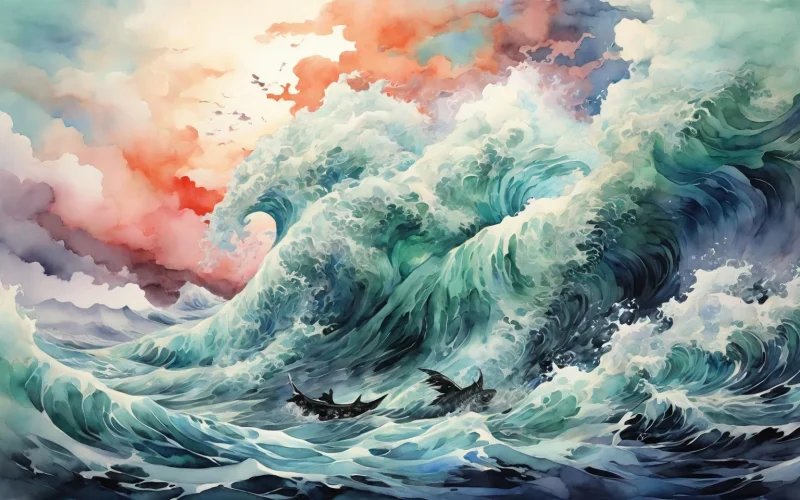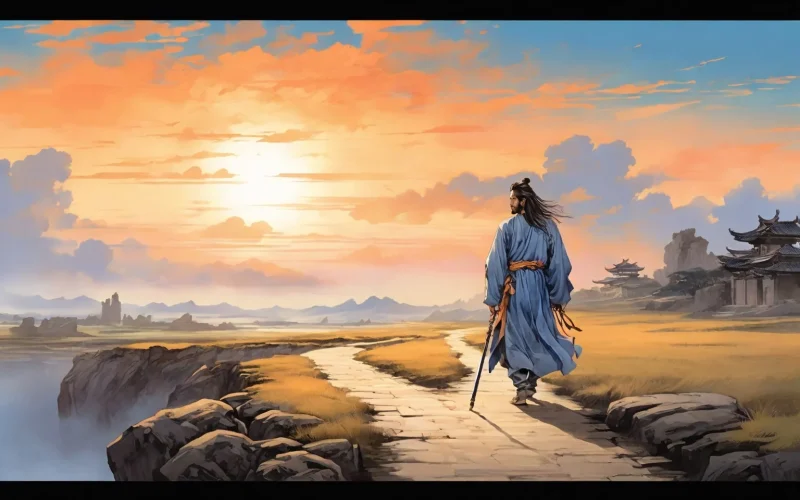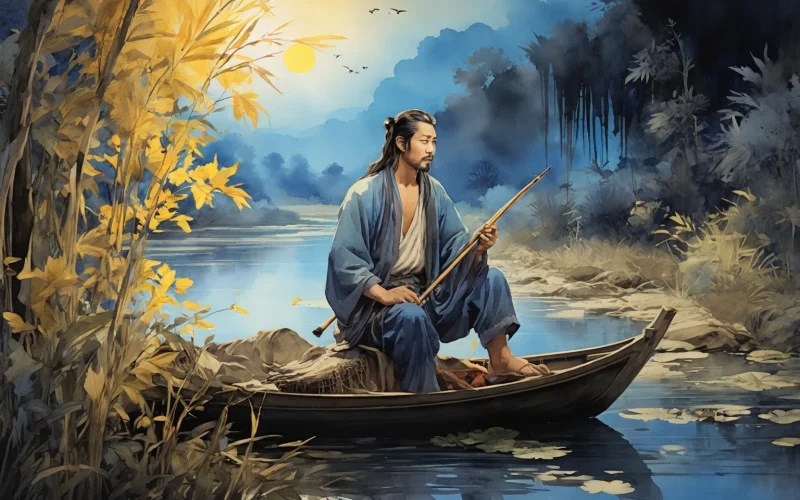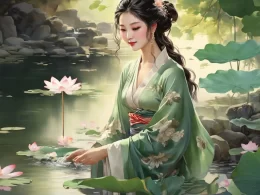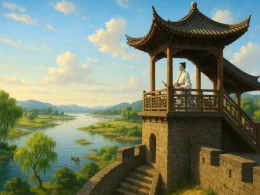A giant fish released in deepest sea,
Finds freedom’s hour—swims with destiny.
Wind gusts through fins like banners spread,
Waves churn beneath its lashing tread.
Dragon-surged, it shifts earth’s core,
Whale-transformed, dreams heaven’s shore.
Just when it craves ship-swallowing might,
How trite seem minnows’ shallow flight!
We pity swallows nesting frail,
Mock turtles sunk in murky jail.
So scholars meeting lords of light
Unfurl their talents—blade burns bright!
Original Poem
「巨鱼纵大壑」
钱起
巨鱼纵大壑,遂性似乘时。
奋跃风生鬣,腾凌浪鼓鳍。
龙摅回地轴,鲲化想天池。
方快吞舟意,尤殊在藻嬉。
倾危嗟幕燕,隐晦诮泥龟。
喻士逢明主,才猷得所施。
Interpretation
This poem was composed during the golden age of the Tang Dynasty, as the poet, confronting the vicissitudes of official life and the suppression of his talents, sought solace in natural imagery. Through the symbolic figure of a "leviathan fish," he conveys his refusal to accept mediocrity and his yearning to realize his aspirations. The entire poem embodies profound meaning within its imagery, using the legendary Kunpeng's ambition as a metaphor for himself—reflecting both responsiveness to the era's dynamism and deep introspection about his own destiny, infused with positive expectations.
First Couplet: "巨鱼纵大壑,遂性似乘时。"
Jù yú zòng dà hè, suì xìng shì chéng shí.
The leviathan swims freely through vast abysses,
Following its nature as if seizing opportunity.
The opening lines highlight the leviathan’s majestic form, emphasizing the boundless space it navigates and its effortless movement—symbolizing the poet’s ambition to traverse the world and await his moment to rise.
Second Couplet: "奋跃风生鬣,腾凌浪鼓鳍。"
Fèn yuè fēng shēng liè, téng líng làng gǔ qí.
Leaping fiercely, its mane stirs the winds,
Soaring through waves, its fins churn the tides.
This vivid depiction of the leviathan breaching the waves—dynamic and powerful—embodies the energy to break through constraints and strive upward, reflecting the poet’s refusal to remain ordinary and his determination to rise above.
Third Couplet: "龙摅回地轴,鲲化想天池。"
Lóng shū huí dì zhóu, kūn huà xiǎng tiān chí.
Like a dragon, it shakes the earth’s axis,
As the Kun-fish transforms, yearning for celestial pools.
Transitioning into mythological imagery, the "dragon" and "Kun-fish" (a mythical creature that becomes the great Peng-bird) symbolize transcendence, elevating the leviathan into a divine force. This suggests that extraordinary talent, given the right opportunity, can shake the heavens and soar to greatness.
Fourth Couplet: "方快吞舟意,尤殊在藻嬉。"
Fāng kuài tūn zhōu yì, yóu shū zài zǎo xī.
Reveling in its ambition to swallow boats whole,
Yet still it lingers, playing among the reeds.
Though the leviathan harbors grand ambitions ("swallowing boats"), it retains a leisurely demeanor—seemingly contradictory but revealing the complexity of a scholar’s heart: even in obscurity, he preserves his nobility and unyielding spirit.
Fifth Couplet: "倾危嗟幕燕,隐晦诮泥龟。"
Qīng wēi jiē mù yàn, yǐn huì qiào ní guī.
Lamenting the sparrow nesting precariously under eaves,
Mocking the mud-turtle hiding in obscurity.
By disparaging the timid sparrow and the stagnant turtle, the poet scorns those who cling to mediocrity, emphasizing that true ambition must ride the winds and break through waves—never resigning to hardship or self-diminishment.
Sixth Couplet: "喻士逢明主,才猷得所施。"
Yù shì féng míng zhǔ, cái yóu dé suǒ shī.
This symbolizes the scholar meeting an enlightened lord,
Where his talents and strategies may fully unfold.
The concluding couplet clarifies the poem’s central theme: the leviathan represents the scholar’s aspirations, and the poet himself. This line serves as the revelatory stroke—that the key to realizing one’s potential lies in encountering a discerning ruler and the right moment in time.
Holistic Appreciation
This poem unfolds with extraordinary imagination, using the allegory of a colossal fish to explore themes of natural power, mythical transformation, and the scholar's worldly struggles—progressively elevating its central message. The "giant fish" leaping from deep waters symbolizes an indomitable spirit refusing to sink into obscurity; its metamorphosis into a dragon or kun (mythical leviathan) reflects the poet's self-affirmation and aspirations. Though it may linger among waterweeds, its "ship-swallowing ambition" remains undiminished, embodying noble restraint without resignation. The closing lines express hope for meeting an enlightened ruler to fulfill one's potential, echoing the opening call to "seize the moment." Grand in vision and lofty in purpose, the poem blends emotion and reason, showcasing the poet's upward-striving idealism.
Artistic Merits
- Potent Symbolism: The "giant fish" serves as a unifying motif, imbued with divine and philosophical significance—a tightly structured metaphor for human struggle.
- Myth-Reality Fusion: Mythic creatures (dragon, kun) contrast with mundane "sparrows" and "mud-dwelling turtles," highlighting the tension between unrecognized talent and unyielding resolve.
- Vigorous Diction and Rhythm: Lines like "scaling waves with fins thrashing" and "a dragon coiling back the earth's axis" resound with majestic momentum, exemplifying the rhythmic power of classical five-character verse.
- Philosophy Embodied in Imagery: Nature mirrors human ambition; vivid scenes carry layered wisdom, conveying profound truths without didacticism.
Insights
The poem’s leviathan symbolizes gifted individuals, affirming that true talent will achieve greatness when opportunity arises. It teaches us: the capable should never succumb to present adversity but, like the giant fish, bide their time in depth. More crucially, one must guard ideals against compromise—neither wallowing with turtles nor envying sparrows—while honing abilities. When fortune’s winds blow, such preparedness enables soaring beyond limits to chart an unbounded destiny.
About the Poet
Qian Qi (钱起, c. 722-780), a native of Huzhou, Zhejiang, was the foremost of the "Ten Talents of the Dali Era" in mid-Tang poetry. His poetic style, inheriting Wang Wei's legacy, excelled particularly in regulated verse (五律), characterized by its ethereal elegance. Yan Yu praised his work as "innovative in form," reflecting the Dali period's transition from the High Tang's naturalism to refined craftsmanship.





